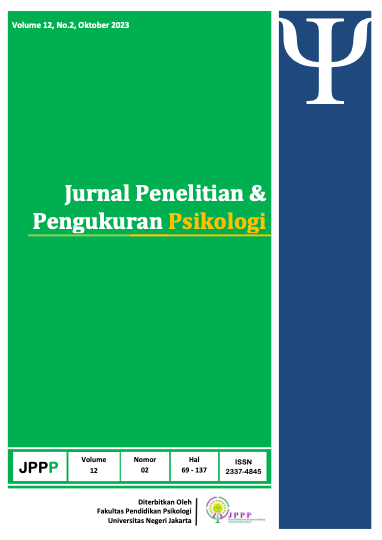Menelaah Learning Loss Selama Emergency Remote Teaching di Indonesia
DOI:
https://doi.org/10.21009/JPPP.122.01Keywords:
emergency remote teaching, learning lossAbstract
The emergence of the Covid 19 Pandemic in March 2020 in Indonesia meant that education implementation regulations needed adjustments to protect education implementers from this infectious virus. The government has determined Distance Learning (PJJ) as the new learning regulation and is most likely to be implemented. Transforming learning activities from face-to-face to PJJ should require careful preparation and adequate training. However, due to its emergency nature and not much time available, preparations were not carried out as planned. The urgent transition to online teaching as a response to the COVID 19 pandemic is referred to as emergency remote teaching (ERT). Emergency Remote Teaching is a distance teaching method applied by educational institutions in crisis situations because face-to-face learning is not possible. The transition from face-to-face learning to ERT has caused a number of new problems to emerge in the world of education. With several obstacles and problems found, learning during the ERT period recorded at least a third of the school year lost. This situation could potentially lead to a decline in academic knowledge and skills which could cause learning loss. Learning loss will continue to impact and accumulate even until students return to face-to-face learning. School closures due to the Covid-19 pandemic and increasing the risk of learning loss can also have a significant impact on the risk of decreasing happiness
References
Bonal, X., & Gonzalez, S. (2020). The impact of lockdown on the learning gap: Family and school divisions in times of crisis. International Review of Education, 66, 635–655. https://doi.org/10.1007/s11159-020-09860-z
Cahyadi, A., Hendryadi, Widyastuti, S., Mufidah, V.N., & Achmadi. (2021). Emergency remote teaching evaluation of the higher education in Indonesia. Heliyon, 7, 1-9. https://doi.org/10.1016/j.heliyon.2021.e07788
Cerelia, J.J., Sitepu, A.A., Azhar L.N, F., Pratiwi, I.R., Almadevi, M., Farras, M.N., Azzahra, T.S., Toharudin, T. (2021). Learning loss akibat pembelajaran jarak jauh selama pandemi covid-19 di indonesia. Seminar Nasional Statistika X.
Di Pietro, D., Biagi, G., Costa, P., Karpinski, Z., & Mazza, J. (2020). The likely impact of COVID-19 on education: Reflections based on existing literature and recent international datasets (EUR 30275 EN). Publications Office of the European Union
Donnelly, R., & Patrinos, H. A. (2021). Learning Loss During Covid-19: An Early Systematic Review. Covid Economics Vetted and Real-Time Papers, 77. https://doi.org/10.1007/s11125-021-09582-6
Gonzalez, T., de la Rubia, M. A., Hincz, K. P., Comas-Lopez, M., Subirats, L., Fort, S., & Sacha, G. M. (2020). Influence of Covid-19 confinement on students’ performance in higher education. PLoS ONE, 15(10), e0239490
Hodges C, Moore S, Lockee B, Trust T, Bond A. (2020). The difference between emergency remote teaching and online learning. Educ Rev, 27, 1-9.
Howard, P., & Howard, J. (2012). Pandemic and pedagogy: Elementary school teachers’ experiences of H1N1 influenza in the classroom. Phenomenology & Practice, 6(1), 18–35. https://doi.org/10.29173/pandpr19852
Iglesias-Pradas, S., Hern´andez-García, A., Chaparro-Pel´aez, J., & Prieto, J.L. (2021). Emergency remote teaching and students’ academic performance in higher education during the COVID-19 pandemic: A case study. Computers in Human Behavior, 119, 1-18.
Joshi M.A., Krishnappa, P., & Prabhu, A. V. (2022). Faculty satisfaction and perception regarding emergency remote teaching An exploratory study, Medical Journal Armed Forces India, https://doi.org/10.1016/j.mjafi.2022.04.005
Kimm, L., & Ashbury, K. (2020). Like a rug has been pulled under you: The impact of COVID-19 on teachers in England during the first sixweeks of the U.K. lockdown. Psyarxiv. https://psyarxiv.com/xn9ey/
Kuhfeld, M., Tarasawa, B., Johnson, A., Ruzek, E., & Lewis, K. (2020). Learning during Covid-19: Initial findings on students’ reading and math achievement and growth. NWEA Research. https://www.nwea.org/ content/uploads/2020/11/Collaborative-brief-Learning-during-COVID-19
Li, A., Harries, M., & Ross, L. F. (2020). Reopening K-12 schools in the era of coronavirus disease 2019: review of State-Level guidance addressing equity concerns. The Journal of pediatrics, 227, 38-44. https://doi.org/10.1016/j.jpeds.2020.08.069
Mardini, G.H., & Mah’d, O.A. (2022). Distance learning as emergency remote teaching vs. traditional learning for accounting students during the COVID-19 pandemic: Cross-country evidence. Journal of Accounting Education, 61. 1-18
Noviantari, I., & Faridhoh. (2021). Analisis learning loss kemampuan literasi statistis mahasiswa. Jurnal Pendidikan Matematika Raflesia, 06(03), 112-120.
Pier, L., Hough, H. J., Christian, M., Bookman, N., Wilkenfeld, B., & Miller, R. (2021). Covid-19 and the educational equity crisis: Evidence on learning loss from the CORE data collaborative. Policy analysis for California Education. https://edpolicyinca.org/newsroom/covid-19-and-educational-equity-crisis.
Riyadhi, B. (2022). Understanding education character loss during long-distance learning in pandemic disruption in madrasah. International Journal of Social Sciences and Humanities, 6(2), 130-141. https://doi.org/10.53730/ijssh.v6n2.10108
Schleicher, A. (2020). The impact of COVID-19 on education: Insights from education at a glance. OECD Publishing. https://www.oecd.org/education/education-at-a-glance/
Siapac, A., Balcerzak, P., & O’Brien, K. (2021). Handbook of Research on The Global Empowerment of Educators and Student Learning through Action Research. IGI Global. https://doi.org/10.4018/978-1-7998-6922-1
Skar, G. B. U., Graham, S., & Huebner, A. (2021). Learning loss during the covid-19 pandemic and the impact of emergency remote instruction on first grade students’ writing: A natural experiment. Journal of Educational Psychology, 1(1–14).
Sprang, G., & Silman, M. (2013). Posttraumatic stress disorder in parents and youth after health-related disasters. Disaster Medicine and Public Health Preparedness, 7(1), 105–110. https://doi.org/10.1017/dmp.2013.22
Tomasik, M., Helbling, L., & Moser, U. (2020). Educational gains of in-person vs. distance learning in primary and secondary schools: A natural experiment during the Covid-19 pandemic school closures in Switzerland. International Journal of Psychology, 56(4), 566–576.
University of The People. (2021). Emergency Remote Teaching VS Online Teaching: A comparison. University of The People. https://www.uopeople.edu/blog/emergency-remote-teaching-vs-online-learning/
Yudhistira, S., & Murdiani, D. (2020). Pembelajaran jarak jauh: kendala dalam belajar dan kelelahan akademik. Maarif, 15(2), 373–393.
Yulianto, R., & Yamin, R.D. (2022). The impact of learning loss during a pandemic among students. Journal Advance in social sciences and Policy, 2(2). 70-80.







